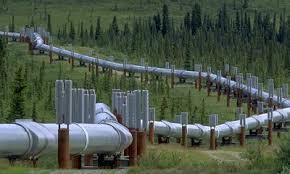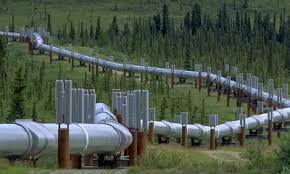
Signaling that prolonged uncertainty is preferable to rejection of the $8 billion project, the Canadian company behind the proposed Keystone XL pipeline chose to plead with the U.S. government for a delay on its fate, faced with dimming prospects for approval.
Fearing an impending "no" from President Barack Obama to the nearly 1,200-mile (2,000-km) cross-border pipeline, market experts are viewing Monday's appeal by Calgary-based TransCanada Corp as an attempt to avert the negative answer form the US President.
While the US President has been repeatedly expressing doubts about the merits of the pipeline, the Obama administration has become more vocal and active on climate change issues as it closes in on its final year in office.
TransCanada's request for a delay came amid a darkening political outlook for the project on both sides of the border.
A time consuming dispute with landowners over the proposed pipeline route has been plaguing the company in Nebraska. The company lost a powerful advocate in October when Conservative Prime Minister Stephen Harper, who had openly allied with Republican leaders in his aggressive lobbying for Keystone in Canada. Harper was defeated by Liberal leader Justin Trudeau.
While issuing a warning for Keystone saying that both the pipeline and wider oil sands development must demonstrate improved environmental sensitivity, even as Trudeau has offered cautious backing for Keystone.
And unlike Harper, Trudeau does not face any political damage from U.S. rejection of a pipeline. The incumbent Prime Minister of Canada has already made it clear that any politics of Keystone to disproportionately define relations between the US and Canada would not be allowed by him unlike his predecessor.
Reuters reported, quoting U.S. lobbyists close to the case in Washington, that TransCanada was finally facing political reality, recognizing that a delay would better protect shareholder value than allowing Obama to reject the project.
The plea for the delay comes shortly after the White House said it still expected Obama to make a decision on whether to grant the permit before he leaves office in January 2017 and on the eve of TransCanada issuing an earnings report.
Keystone's fate would almost certainly fall to the next president in case Obama disagrees or suspends taking a decision on the permit. While leaders like Donald Trump did qualify that in October, saying he would seek a "better deal" from TransCanada, Republicans have been universally supportive of building Keystone. Democratic Party front-runner Hillary Clinton is opposed to the pipeline.
Observers are of the view that the request to suspend the review has put forward an opportunity for President Obama to refrain from having to make a final call on a decision he has avoided for years. Hurdled by various court cases, technical delays and the president's apparent reluctance to choose, the permit for the project has been delayed constantly despite TransCanada beginning the licensing process in 2008.
The request of TransCanada was greeted with a blizzard of demands on Obama to ignore TransCanada's move and kill the pipeline anyway and analysts are of the view that the pressure on President Obama would remain despite the delay request.
(Source:www.reuters.com)
Fearing an impending "no" from President Barack Obama to the nearly 1,200-mile (2,000-km) cross-border pipeline, market experts are viewing Monday's appeal by Calgary-based TransCanada Corp as an attempt to avert the negative answer form the US President.
While the US President has been repeatedly expressing doubts about the merits of the pipeline, the Obama administration has become more vocal and active on climate change issues as it closes in on its final year in office.
TransCanada's request for a delay came amid a darkening political outlook for the project on both sides of the border.
A time consuming dispute with landowners over the proposed pipeline route has been plaguing the company in Nebraska. The company lost a powerful advocate in October when Conservative Prime Minister Stephen Harper, who had openly allied with Republican leaders in his aggressive lobbying for Keystone in Canada. Harper was defeated by Liberal leader Justin Trudeau.
While issuing a warning for Keystone saying that both the pipeline and wider oil sands development must demonstrate improved environmental sensitivity, even as Trudeau has offered cautious backing for Keystone.
And unlike Harper, Trudeau does not face any political damage from U.S. rejection of a pipeline. The incumbent Prime Minister of Canada has already made it clear that any politics of Keystone to disproportionately define relations between the US and Canada would not be allowed by him unlike his predecessor.
Reuters reported, quoting U.S. lobbyists close to the case in Washington, that TransCanada was finally facing political reality, recognizing that a delay would better protect shareholder value than allowing Obama to reject the project.
The plea for the delay comes shortly after the White House said it still expected Obama to make a decision on whether to grant the permit before he leaves office in January 2017 and on the eve of TransCanada issuing an earnings report.
Keystone's fate would almost certainly fall to the next president in case Obama disagrees or suspends taking a decision on the permit. While leaders like Donald Trump did qualify that in October, saying he would seek a "better deal" from TransCanada, Republicans have been universally supportive of building Keystone. Democratic Party front-runner Hillary Clinton is opposed to the pipeline.
Observers are of the view that the request to suspend the review has put forward an opportunity for President Obama to refrain from having to make a final call on a decision he has avoided for years. Hurdled by various court cases, technical delays and the president's apparent reluctance to choose, the permit for the project has been delayed constantly despite TransCanada beginning the licensing process in 2008.
The request of TransCanada was greeted with a blizzard of demands on Obama to ignore TransCanada's move and kill the pipeline anyway and analysts are of the view that the pressure on President Obama would remain despite the delay request.
(Source:www.reuters.com)





